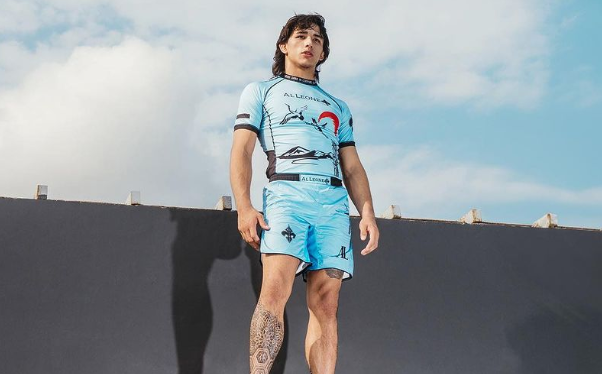Jozef Chen reveals how he became world-class in just 5 years
Recent ADCC Trials champion Jozef Chen spoke to Grappling Insider about his rapid ascension in no-gi jiu-jitsu.
Few no-gi competitors have seen a quicker climb to elite status than 19-year-old brown belt Jozef Chen.
In September, Chen defeated three ADCC veterans – Tommy Langaker, Mateusz Szczecinski, and Oliver Taza – to claim gold at the first ADCC European Trials, marking one of the most impressive tournament runs of the year.
Perhaps the most remarkable aspect of his rapid ascension is the fact that, unlike other young phenoms such as Cole Abate or the Ruotolo brothers, Chen only began training in jiu-jitsu at the age of 14. What’s more, the vast majority of his time in BJJ has been spent not training at a large, internationally recognized academy.
Chen recently sat down with Grappling Insider to discuss his method for rapid improvement, what it’s like training at the famed B-Team in Austin, and some of his trademark techniques.
Check out the full interview with Jozef Chen below.
Chen began his training in China and, importantly, was at an academy that allowed him a great deal of leeway with his own learning – whether that meant practicing moves learned from instructionals or simply trying his own techniques during class.
“It wasn’t just instructionals. I think I also came up in an environment that was very conducive to this type of improvement. My coach was very open to me watching instructionals and very helpful in this regard… The gym was open to me also practicing my own techniques during classes.”
Beginning with Gordon Ryan and John Danaher, Chen methodically devoured instructionals. But rather than simply watching hours of jiu-jitsu and hoping to absorb the information, he followed a specific set of steps to learn and implement the techniques being taught.
He outlined that approach:
“I tend to not watch them in full blasts. The longest I’ll ever do is a volume at a time… I’ll screen record a lot of the stuff that I want to work on. So, let’s say he goes through one volume. Realistically, I’m not gonna be able to recall everything in, let’s say an hour and a half of instruction. I’ll just screen-record certain parts that I think are important for me to practice and keep in mind when training. Before I go training, I’ll have, like, three, minute-long videos that I’ll go back and refer to.”
Depending on the structure of class that day, Chen would then try to practice or implement techniques he saw in the instructional.
In the case of a technique-based class, he would drill the techniques. But if the class was centered around rolling, Chen would find and work with specific partners and create specific situations to test those techniques against a resisting opponent.
Additionally, Chen’s first coach was a purple belt under black belt Rob Biernacki – a respected coach at the forefront of concept-driven learning in BJJ. Following Biernacki’s guidance, Chen’s coach implemented some non-traditional teaching methods such as game-playing, which Chen credits as instrumental in his development:
“So, like, different types of games. So you see right now, ecological approach is becoming very popular. But these were games that were played when I started training… Stuff like that, as well as the aid of instructionals, I found really helped with my own progress.”
Nowadays, Chen is a frequent visitor at the B-Team in Austin, Texas, where he trains alongside a number of the world’s top no-gi competitors, including Craig Jones, Nick Rodriguez, and Nicky Ryan.
But Chen hasn’t always trained with professional competitors. He says that working with hobbyists or grapplers of a lesser skill level is beneficial to his own growth:
“I do think there’s something to be said about training with people who aren’t necessarily all competitors because there is a benefit to it… When I train with people who are of lesser skill than me, I find that one, it’s an opportunity for me to play with new ideas… If I’m not very good at something and I have an idea that I think may work but I’m not completely familiar with it and I try it against someone who is very good, the likelihood is that it’s gonna fail pretty badly. So having that environment to let it grow a little bit and figure out the kinds, per se, that I think is very important.”
With this mindset, Chen has been able to develop his technique at his home gym in China before “pressure testing” them against the elite competitors at the B-Team.
The results speak for themselves. At just 19 years old and a handful of years into the sport, Chen has earned his spot in the most prestigious no-gi tournament and rightfully earned the reputation of one of jiu-jitsu’s most talented young athletes.

